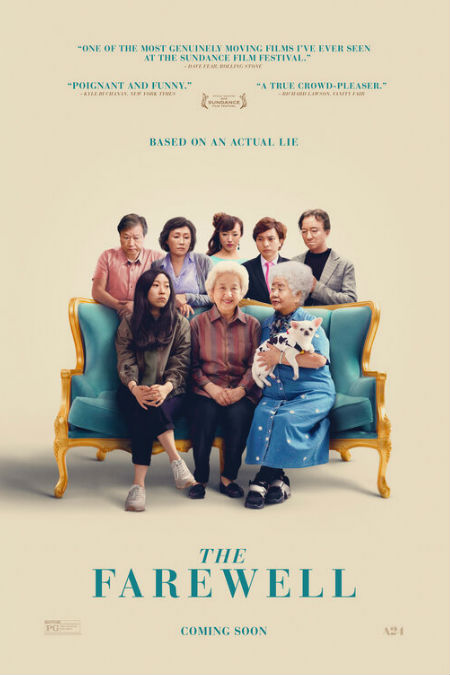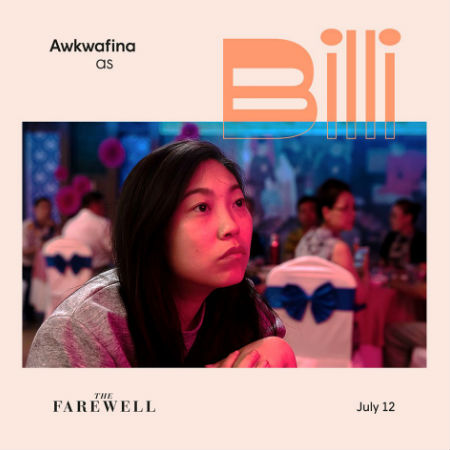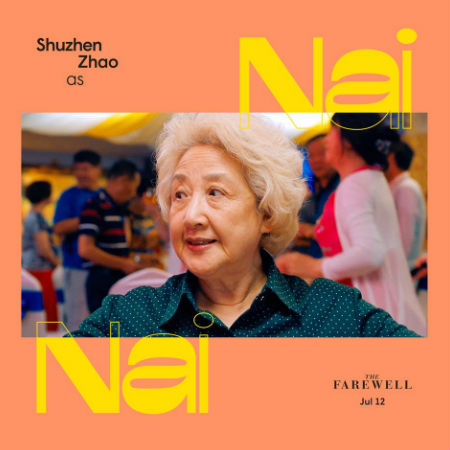
Saying a final goodbye to the one you love the most is never, ever easy.
It’s made infinitely more sorrowful if you can’t say goodbye at all, or if, as in the case of the Lulu Wang-written and directed film, The Farewell, if the person you are farewelling isn’t even aware that their time on earth is drawing to all-too-premature end.
Billing itself as being “based on an actual lie”, the film is based in part on the writer-director’s own family where the paternal matriarch of the family, Nai Nai, was given a terminal diagnosis of stage 4 cancer.
Or rather, and here the film’s plot pivots on equal parts moving and hilarious fashion, not given it at all.
In The Farewell, of course, events are heightened for maximum comedic and emotional impact, with Nai Nai (a superlative performance by Zhao Shuzhen) blissfully unaware that the real reason her family have all assembled together for the first time in 25 years is not to celebrate a wedding but to say goodbye to the woman who holds the family together with equal portions of love and astonishingly strong maternal control.
Ostensibly her two sons, Haiyan (Tzi Ma), who lives in New York with wife Jian (Diana Lin) and aspiring writer daughter Billi (Awkwafina in the film’s other standout performance) and Japan-based Haibin (Jiang Yongbo) and his wife are there for the hastily-called and arranged wedding of Haibin’s son, and Nai Nai’s grandson Hao Hao (Chen Han) to the delightfully-bewildered Aiko (Aoi Mizuhara).
But the truth, of course, is that they all there to say goodbye to the lynchpin of the family in such a way Nai Nai, backed to the hilt now as always by younger sister Little Nai Nai (Lu Hong) suspects nothing.
While the older members of the family accept it as their duty to shoulder the emotional burden of keeping the truth from Nai Nai, explaining to the Billi and Hao Hao, who aren’t handling either the news or the well-intentioned duplicity at all well, that in China, familial and societal obligations trump individual ones.
Everyone feels devastatingly sad but what is required are spirited performances worthy of Oscars and Baftas and not, as is often the case in Western situations where diagnoses are openly known and mourned, open displays of mournful emotion.

So lacking in confidence are Haiyan and Jian about daughter Billi’s ability to stick to the script – she is very close to her grandmother and greets the news, as anyone would, with desperate sadness and impelling need to reveal the truth while there’s still time to say goodbye – that she is left behind in the States.
But regretting her acquiescence to this piece of parental decision-making, Billi maxes out her credit cards and jumps on a flight to Changchun, China, to say goodbye to the beloved Nai Nai is as discreet a way as she can manage.
Hamstrung by less than fluent Mandarin, though she is assured it is very good, and certainly she is more practised in the language than her Japanese-domiciled cousin, she nevertheless dives into the chaotic family reunion which, centres as it is in most families the world over, on epic meals, assuring her parents that she too can have blood of ice and the face of a carnival clown laughing at an enduringly good joke.
It is, by any estimation, a trial by omission and while Billi understands the cultural imperatives at play and honours them, she is deeply torn, desperately conflicted about keeping something so important from her grandmother with whom she is honest to a fault.
The Farewell may sound like the set-up and execution of some slapstick farce where the strain and effort of keeping the secret, a gargantuan life-ending secret, gives way to a highly-funny end where the diagnosis becomes known to Nai Nai, blurted out in a drunken slurry by Billi who can’t play the role of familial deceiver any longer.
But The Farewell, though broadly funny, possessed of a narrative that humourously observes and affectionately lives out the many glorious dynamics and contrary tics of a Chinese family, is not at heart a comedy.
It is full to the brim with witty oneliners and wryly-delivered, sharply-judged observances, with much of the MVVP honours going to Zhao for a remarkably-poised performance as a woman unaware her life is ticking down to its end in just a few short months, but it is not, at its beautifully-expressed and poignantly moving heart a laughfest.
Rather it is a reflection of the messy business of life itself from a Chinese perspective where what you might want to do and say must play necessary second fiddle to far greater societal and familial imperatives.
From a Westerner’s perspective, the decision to keep the truth from Nai Nai feels cruel and duplicitous but when it is explained one night when Haiyan begins to doubt if he is doing the right thing, egged on by Billi’s constant, well-meaning questioning, that keeping the truth is the ultimate act of load-bearing love, Wang casts events in a wholly new, understandable, and yes, illuminating light.

Wang not only approaches the issue from a cultural perspective with which, being autobiographical, she is no doubt intimately familiar.
She also examines how concealing the true state of her health from Nai Nai affects and is handled differently by each generation.
While Haiyan and Haiban and their respective spouses, and other China-based family members such as Little Nai Nai unquestionably (for the most part, anyway; at various points both sons have their quickly-dismissed doubts) support leaving Nai Nai blissfully in the dark, her only pressing concern being the planning of Hao Hao’s wedding and a weirdly persistent cough, the two grandchildren are stricken with the deceit of it all.
While neither gives away the secret, both come dangerously close to doing so; while it would be easy to dismiss the younger generation as more in touch and the older as out of touch, there is no such simplistic determination in Wang’s brilliantly-nuanced script.
Both generations’ viewpoints are examined, held up to cultural, societal and familiar lights, and treated with understanding and respect; however, what prevails is a powerful cultural imperative that is not applied unthinkingly but without any real substantial negotiation.
It simply is how things are, and by laying out the pros and cons and the underlying rationale for keeping things from Nai Nai, who is a delight especially in her warm, rich scenes with Billi, we come to understand why everyone sticks to their guns.
This decision to ultimately leaving Nai Nai unknowing and unaware, frames the final heartfelt scenes even more graphically, imbuing the farewell scenes as Billi and her parents leave to fly back to the US, with even more rip-your-heart-out emotional resonance.
There is one particular moment that will leave you gasping for breath so profoundly moving is it, and thanks to a script that never takes the easy option and always bolsters its narrative with beautifully-explained reasons why and the time for the truth of things to settle and be truly felt (some of the wordless interlinking scenes are increibly impacting as a result), everything about The Farewell feels intensely real, proof that life is never as easy or straightforward as we wish it was and that navigating it is often a severe test for the head and, in this case, the heart.